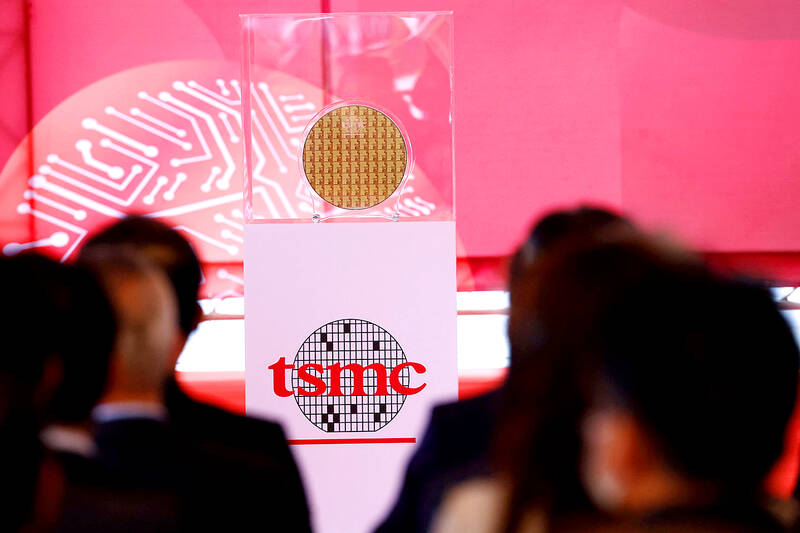Taiwan’s foundry industry would see its global market share dip to 44 percent in 2026 as the US, China and other countries race to build local capacity to boost chip resilience amid escalating geopolitical risks, TrendForce Corp (集邦科技) said yesterday.
At present, Taiwan’s major foundry services providers together command 47 percent of the global market, statistics provided by TrendForce showed.
“Governments around the world are offering subsidies or tax incentives to encourage construction of local chip capacity, with the aim of minimizing risks of being overly dependent on Taiwan or Asia for chip supply amid rising geopolitical risks,” TrendForce analyst Joanne Chiao (喬安) told a forum organized by the research house in Taipei.

Photo: Ann Wang, Reuters
“The US and Japan are concentrating mostly on expanding advanced semiconductor capacity at home,” she said.
As a result, Taiwan’s foundry industry would see a bigger market share decline of 14 percentage points to 66 percent in 2026 from 80 percent now in the advanced chips area, that is, 7-nanometer, 5-nanometer or 3-nanometer chips, the researcher said.
“Despite the market share loss, Taiwan will continue to play a critical part in the world’s semiconductor supply chain as the world’s most advanced chips will still be made in Taiwan,” Chiao said.
Taiwan Semiconductor Manufacturing Co (台積電) expects to ramp up production of 2-nanometer chips in 2025 at its factories in Hsinchu and Taichung.
The chipmaker’s Arizona plant is to start making 4-nanometer chips by the end of next year.
The US would see its market share jump to 12 percent in 2026, from a very minimal share, in the advanced chips segment, the statistics showed.
China would see little progress, accounting for only 1 percent of the global market, as major Chinese chipmakers Semiconductor Manufacturing International Corp (中芯國際) and Hua Hong Semiconductor Ltd (華虹半導體) are unable to access key equipment for technology upgrades due to export restrictions from the US and Japan, TrendForce said.
The US and Japan have banned companies from exporting advanced semiconductor equipment and technology used in making 16-nanometer and more advanced chips to China.
The Netherlands might soon follow suit, Chiao said.
“Photolithography equipment is the choke point for China in expanding to advanced semiconductor technologies,” Chiao said. “The export restrictions will hold back China’s progress significantly.”
ASML Holding NV of the Netherlands is the world’s only supplier of photolithography equipment, or extreme ultraviolet lithography tools used in 3-nanometer technology, TrendForce said.
Japan’s Nikon Precision Industry Inc and Canon Inc supply photolithography equipment used in 28-nanometer technology.
Shanghai Micro Electronics Equipment Group (上海微電子), China’s sole semiconductor lithography specialist, can only supply equipment used in less advanced 90-nanometer technology at best, TrendForce said.
Overall, China’s market share is expected to rise to as high as 26 percent in 2026 from 24 percent this year, as it provides significant subsidies for domestic semiconductor capacity expansions in a bid to achieve its ambitious goal of achieving 70 percent chip self-sufficiency by 2025, it said.

When an apartment comes up for rent in Germany’s big cities, hundreds of prospective tenants often queue down the street to view it, but the acute shortage of affordable housing is getting scant attention ahead of today’s snap general election. “Housing is one of the main problems for people, but nobody talks about it, nobody takes it seriously,” said Andreas Ibel, president of Build Europe, an association representing housing developers. Migration and the sluggish economy top the list of voters’ concerns, but analysts say housing policy fails to break through as returns on investment take time to register, making the

‘SILVER LINING’: Although the news caused TSMC to fall on the local market, an analyst said that as tariffs are not set to go into effect until April, there is still time for negotiations US President Donald Trump on Tuesday said that he would likely impose tariffs on semiconductor, automobile and pharmaceutical imports of about 25 percent, with an announcement coming as soon as April 2 in a move that would represent a dramatic widening of the US leader’s trade war. “I probably will tell you that on April 2, but it’ll be in the neighborhood of 25 percent,” Trump told reporters at his Mar-a-Lago club when asked about his plan for auto tariffs. Asked about similar levies on pharmaceutical drugs and semiconductors, the president said that “it’ll be 25 percent and higher, and it’ll

NOT TO WORRY: Some people are concerned funds might continue moving out of the country, but the central bank said financial account outflows are not unusual in Taiwan Taiwan’s outbound investments hit a new high last year due to investments made by contract chipmaker Taiwan Semiconductor Manufacturing Co (TSMC, 台積電) and other major manufacturers to boost global expansion, the central bank said on Thursday. The net increase in outbound investments last year reached a record US$21.05 billion, while the net increase in outbound investments by Taiwanese residents reached a record US$31.98 billion, central bank data showed. Chen Fei-wen (陳斐紋), deputy director of the central bank’s Department of Economic Research, said the increase was largely due to TSMC’s efforts to expand production in the US and Japan. Investments by Vanguard International

WARNING SHOT: The US president has threatened to impose 25 percent tariffs on all imported vehicles, and similar or higher duties on pharmaceuticals and semiconductors US President Donald Trump on Wednesday suggested that a trade deal with China was “possible” — a key target in the US leader’s tariffs policy. The US in 2020 had already agreed to “a great trade deal with China” and a new deal was “possible,” Trump said. Trump said he expected Chinese President Xi Jinping (習近平) to visit the US, without giving a timeline for his trip. Trump also said that he was talking to China about TikTok, as the US seeks to broker a sale of the popular app owned by Chinese firm ByteDance Ltd (字節跳動). Trump last week said that he had